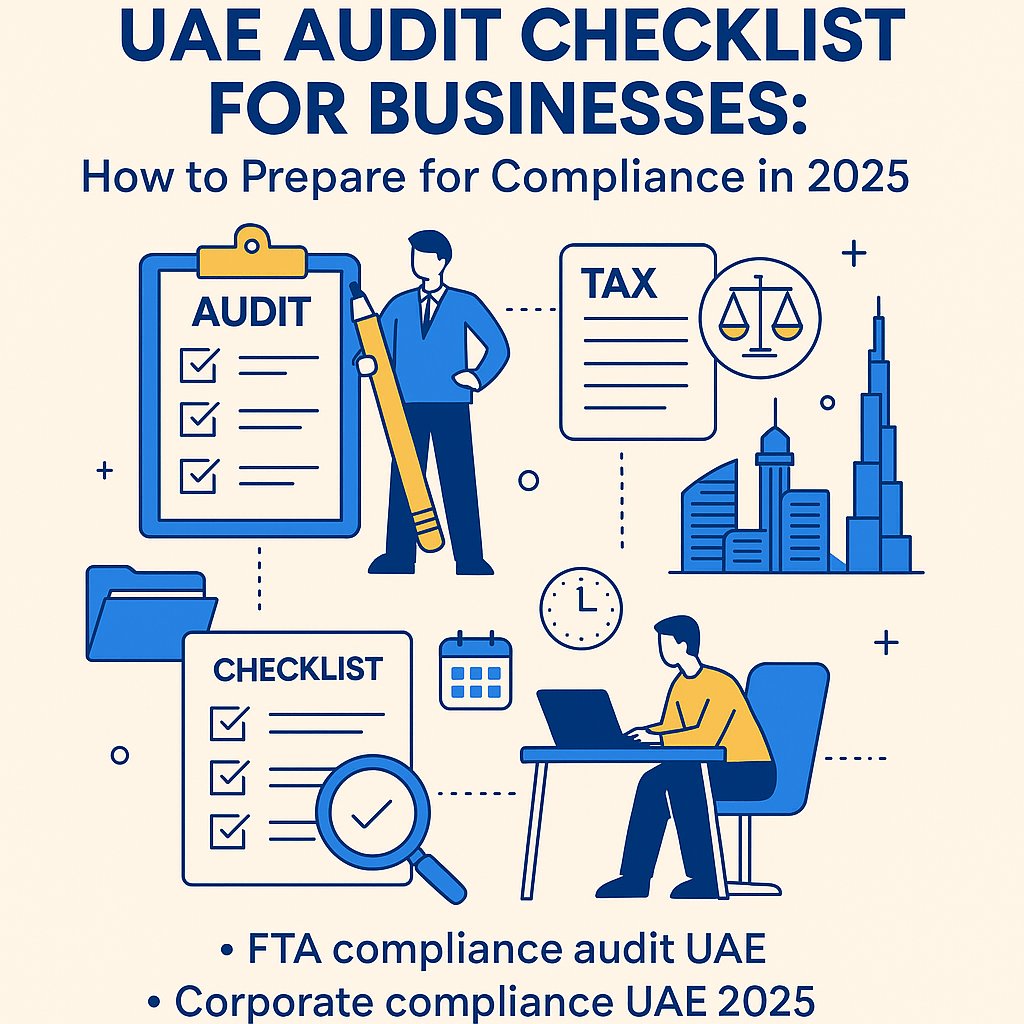As the regulatory landscape continues to evolve, understanding and implementing a solid UAE audit checklist for businesses is more crucial than ever. With new tax frameworks and increased scrutiny, companies must align their processes with UAE compliance standards. This guide provides detailed steps on how to prepare for compliance audit UAE, an overview of the FTA compliance audit UAE and strategies to maintain corporate compliance UAE 2025.
For expert support with audits, compliance or documentation, contact mhsolutionuae.com or call +971 555594403.
Introduction: Why Businesses Need to Be Audit-Ready
The UAE is rapidly modernizing its business and tax environment. Consequently, audits have become a central pillar of financial and operational integrity. A robust audit process helps mitigate risks, avoid penalties and build long-term credibility with regulators and partners. In 2025, preparation is no longer optional—it’s an operational necessity.
FTA Compliance Audit UAE: What Businesses Should Expect
The Federal Tax Authority (FTA) conducts routine audits to ensure accurate tax reporting, recordkeeping and regulatory adherence. Businesses are selected either randomly or due to discrepancies in filings, risk factors or complaints.
Key Focus Areas of an FTA Audit:
- Corporate tax and VAT registration validity
- Accuracy and completeness of filed returns
- Documentation for revenue, expenses and tax deductions
- Ledger and invoice recordkeeping
- Economic Substance Regulations (ESR) and Transfer Pricing (TP)
- Timely tax payment and penalty history
Being audit-ready means having clear, accurate and timely documentation to support all filings.
Corporate Compliance UAE 2025: Your Essential Audit Checklist
To ensure smooth audits and regulatory alignment, businesses should proactively use this 10-point checklist:
- Initial Audit Planning
Define audit scope, timeline and assign responsibilities to relevant staff. - Internal Control Documentation
Review and document internal control systems; update policies to reflect 2025 regulations. - Financial Records Reconciliation
Reconcile accounts payable, receivable and bank statements; finalize ledgers and journals. - Licensing and Legal Compliance
Ensure trade licenses, contracts and registration documents are current and accessible. - Asset and Inventory Checks
Conduct physical verification and update depreciation schedules as needed. - Human Resource Records
Maintain compliant payroll reports, employee contracts, visa data and labor documentation. - Tax Documentation
Compile VAT and corporate tax returns, payment receipts, FTA correspondence and supporting proofs. - Disclosure of Related Party Transactions
Record all related-party dealings and ensure IFRS-aligned reporting. - IT & Cybersecurity Controls
Confirm secure access control, data backup policies and audit trails within ERP systems. - Final Internal Review
Conduct a dry-run audit internally, flag gaps and prepare reports for external auditors.

How to Prepare for Compliance Audit UAE: Best Practices
Implementing best practices ensures readiness before the FTA or external auditors come knocking:
- Stay Informed: Monitor updates from the FTA and Ministry of Finance.
- Digitize Records: Adopt cloud-based ERP or compliance software to reduce manual work.
- Train Staff: Conduct compliance training for finance and operations teams.
- Simulate Audits: Schedule internal mock audits to address risks early.
- Engage Experts: Work with compliance consultants to audit-proof your business.
Common Pitfalls to Avoid
Avoid these common mistakes that often lead to penalties or failed audits:
- Disorganized or missing documentation
- Delayed or incorrect tax submissions
- Inconsistent bank vs. accounting records
- Failure to report or document intercompany transactions
- Outdated trade licenses or expired contracts
Customer FAQs
1. What triggers an FTA compliance audit in the UAE?
Audits may result from risk-based criteria, filing inconsistencies, random selection or third-party complaints.
2. How long must we retain business records?
Generally, UAE businesses should maintain financial and tax records for 5 to 7 years.
3. What are the risks of failing a compliance audit?
Risks include fines, regulatory scrutiny, suspension of licenses or business reputational damage.
4. Is an internal audit mandatory in the UAE?
While not mandatory, internal audits are highly recommended to ensure proper corporate governance.
5. What is the best way to prepare for an audit?
Maintain up-to-date documentation, conduct periodic reviews and respond promptly to auditor requests.
Conclusion: Proactive Compliance is Smart Business
Following a structured UAE audit checklist for businesses is the smartest way to stay compliant in 2025. With audit processes intensifying across corporate tax and VAT enforcement, preparation is no longer reactive—it must be proactive.
If you need expert guidance for compliance, document preparation, or tax audit support, contact MH Solution UAE today at mhsolutionuae.com or call +971 555594403.

